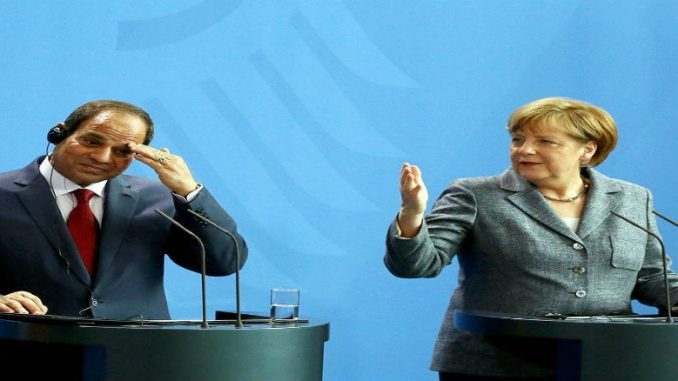
The German government had approved an €800 million ($899 million) arms export deal with Egypt during the period from 1 January to 5 June 2019, the country’s economic affairs ministry announced yesterday.
Responding to a request of information by the German opposition Green Party parliamentarian, Omid Nouripour, the ministry said that it had signed “13 defense export deals with Egypt.” The ministry did not provide details on the types of arms that would be exported to the North African country.
“The German government has this year approved more than €1 billion ($1.1 billion) in defense exports to members of the Saudi-led coalition directly involved in the war in Yemen,” Deutsche Presse-Agentur (DPA) quoted the ministry as saying.
The statement added that Berlin had approved “a total of 56 defense export deals between 1 January and 5 June, including €801.8 million ($900 million) worth of exports to Egypt, €26.1 million ($29.33 million) worth of exports to the United Arab Emirates (UAE), and two defense deals with Saudi Arabia.”
Germany is one of the top five defense exporters in the world. Last year, it imposed a temporary halt on arms exports to Saudi Arabia following the assassination of dissident Saudi journalist Jamal Khashoggi in the Saudi consulate in Turkey’s Istanbul.
In the past five years, German defense exports to Egypt have jumped by 205%, compared with the total exports in the previous five years.
The former main contracts with Egypt were mainly for the marine division of the company ThyssenKrupp, which last year provided a 250 million euro submarine (one of four submarines that the German government approved to supply to Egypt, at a cost of about one billion euros), Diehl Defence, which sold 330 air-to-air missiles to the Egyptian Air Force, Airbus Defense and Space, the Keller and Koch company, which produces light weapons, and Kraus-Maffei Wegmann (KMW), which manufactures armored personnel carriers and tanks.
Experts say that the German attitude towards Egypt as a client for German made weapon systems has totally changed since the signing of a huge deal worth eight billion Euros in 2015 by Siemens, for the construction of two power stations in Egypt.
According to the Stockholm International Peace Research Institute (SIPRI), which published a report on the global defense industry earlier this month, arms sales to Egypt are part of the expansion of German defense exports to the Middle East and to North African countries in general. Between 2012 and 2017, according to the data, Berlin signed deals for the sale of arms to Egypt, Algeria, Tunisia and Morocco worth 11.2 billion Euros.
With regard to the Middle East, the export of German arms to this region has increased by 109% in the past five years, despite the decline in German exports to other regions. According to the research institute, about half of the weapons to the Middle East come from the United States and a quarter from Germany.
It is worth to mention that Egypt under al-Sisi’s regime is ranked the second among developing nations for importing arms in 2015 – buying almost $12 billion worth of arms, according to a new US congressional report.
According to the report, titled “Conventional arms transfers to developing nations, 2008-2015”, developing countries continued to be the biggest purchaser of arms in 2015.
The annual review is considered the most comprehensive assessment of global arms sales available in an unclassified form. The report adjusts for inflation, so the sales totals are comparable year to year.
IHS Inc., the leading global source of critical information and insight, also released a report stating that Egypt is the world’s fourth-largest defense importers. Egypt’s spending on military imports reached US$2.268 billion in 2015, according to the report.
Since Al-Sisi’s military coup in 2013, Egypt has accelerated has its arms deals. Cairo has continued to sign defense deals with Western countries at a time the country is suffering a severe economic crisis and a growing budget deficit. Experts describe Sisi’s move as a way “to distract the Western countries from the country’s deteriorating human rights file and the suppression of the Egyptian regime against its opponents.”
Egypt’s entire defense budget is classified as a state secret and no details on defense spending are available. Even basic information unrelated to defense is classified on the grounds of national security. The defense budget estimated to be around $4.4 billion according to the Transparency International.
v



